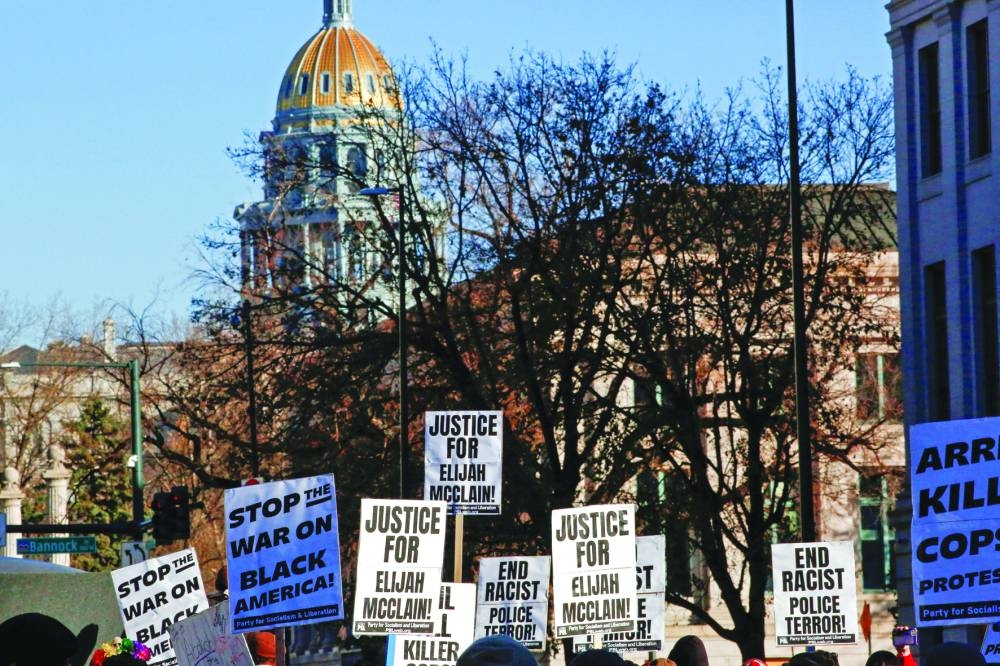One of two paramedics who injected a young black man with ketamine as he was put in a chokehold by US police has been sentenced to 14 months in jail with work release and probation, in the final chapter of a case that became a clarion call in the Black Lives Matter movement.
Jeremy Cooper had been convicted in December of criminally negligent homicide over the death of Elijah McClain, an unarmed 23-year-old who died several days after a struggle with police in Colorado.
He had suffered a cardiac arrest in the ambulance in the moments after his forceful arrest.
At a court in Colorado on Friday, Cooper, 49, was given 14 months in jail with work release, and four years’ probation, US media reported.
Work-release programmes typically require convicts to spent nights and weekends in jail, though they are free to leave for work during weekdays.
Fellow paramedic Peter Cichuniec was convicted of criminally negligent homicide and assault by drugging.
He was sentence last month to five years in prison, the mandatory minimum for the assault conviction.
Paramedics rarely face charges in such cases.
Sheneen McClain, Elijah’s mother, walked out of the courtroom when a tearful Cooper rose to say he was directing sorrowful comments to her son.
She later returned to give her own statement before the court and told Cooper to never invoke her son’s name.
She said the law enforcement culture that permits young black men to be killed with greater frequency than their white counterparts will not change until deep shifts take place.
“America will never be what it could be because it does not look at all its citizens as one race – the human race,” Sheneen McClain said.
She then touched her right hand to her chest and lifted it skyward, choked back tears and concluded: “Long live Elijah McClain, always and forever!”
The episode unfolded in August 2019 when police in the city of Aurora responded to reports of a “suspicious” black male “acting weird” in the street and wearing a ski mask.
McClain’s family later told media that he had been out buying iced tea, and often wore the mask to stay warm because he suffered from anaemia.
One officer said McClain, who was unarmed, had reached for another officer’s gun. No evidence was produced to support this claim.
They grappled with him and while they were restraining him Cichuniec and Cooper injected him with ketamine.
During the trial, the paramedics’ lawyers argued that their clients had simply followed protocol in administering a drug approved in Colorado for people in an “agitated state”.
Prosecutors countered they had ignored their training in handling distressed patients.
McClain’s death occurred months before the killing of another black man, George Floyd, in Minneapolis in May 2020, but drew renewed attention soon after as protests against police brutality swelled.
A celebrity-backed campaign led to a special investigation in which three police officers were ultimately indicted, along with the two paramedics.
Two of the police officers were acquitted, while the third officer was sentenced in January to 14 months behind bars.
Colorado has undergone significant police reforms since the killing of McClain and the following year’s racial justice protests ignited by the killing of Floyd at the hands of police in Minneapolis, Minnesota.
Politicians and experts say more must be done.
“It should not be the way that we have to make policy, to do so based on someone being murdered, like Elijah McClain,” said Colorado state Representative Leslie Herod. “But when Elijah McClain was murdered, we were able to make a lot of progress in a lot of areas that people wanted to ignore or say did not happen here in Colorado.”
Herod said one of the most impactful measures of a sweeping 2020 police reform bill she co-sponsored spelled out that officers have a duty to intervene if they see a colleague committing civil rights violations.
Herod said she is now focusing on providing whistleblower protections for police officers, and said new laws are needed to ensure, for example, that independent bodies investigate allegations against police.

This picture taken in 2020 shows protesters in Denver marching to call for justice for Elijah McClain.
